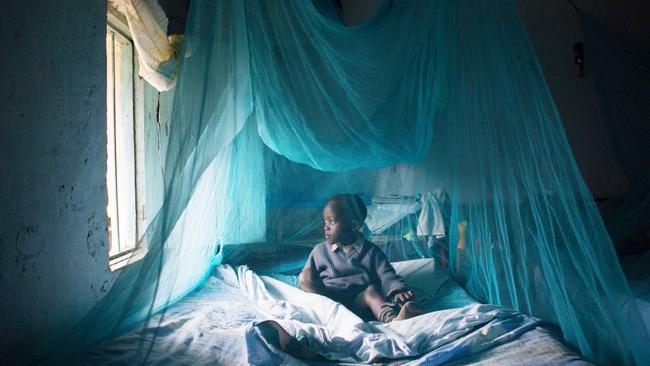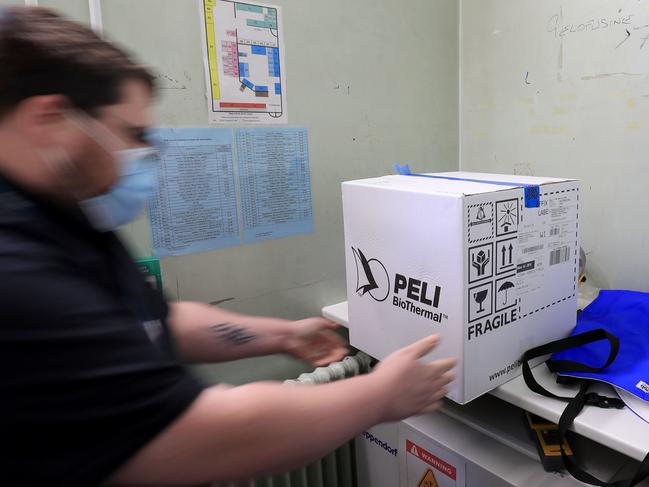The COVID-19 silver linings playbook
The race for a coronavirus vaccine has led to an important breakthrough in battling malaria.

Adrian Hill knew this would be a big year. As head of Oxford’s Jenner Institute, this was the year, if all went well, he would announce a final large-scale trial into a vaccine to prevent a disease that was ravaging swathes of the planet. And last week he did just that. Just not for the disease you’re thinking of.
A century after scientific research on the topic began, 30 years after Hill started working on it and eight years after this version was tried he has, he believes, an effective malaria vaccine. Now he is ready to try it at scale.
However, he concedes, there have been some unforeseen “distractions” in 2020. Not least his other phase three trial, for a vaccine to prevent the other disease ravaging swathes of the planet. “The impact on my day job, making malaria vaccines, was very, very, negative indeed,” he says.
In January, when vaccinology was a Cinderella subject, much of his institute focused on a Cinderella subject within that field: neglected diseases in the developing world. Then, like everyone, Hill became aware of a new disease emerging in China that would change everything.
The Jenner Institute is not, he says, a tightly controlled machine under his aegis. It is closer to a loose collaboration of academics, each with their own interests. So he did not immediately know that one of his colleagues was already preparing a response. “I heard in the third week of January that Sarah was making a vaccine for the Wuhan virus.”
That was Sarah Gilbert, with whom he had worked on past malaria vaccines. A lot of people he has known have gone on to gain academic fame this year. One is his ex-wife. Throughout the year that he has been trying to make a coronavirus vaccine, Sunetra Gupta, one of the Great Barrington Declaration signatories, has been arguing that one isn’t necessary — that we are close to herd immunity. “She is an outstanding theoretical epidemiologist with very strongly held views and a strong position on coronavirus,” is all he will say.
In January Gilbert did not think her Wuhan vaccine would prove useful either, although for a different reason. She thought the outbreak would most likely stop. “It was more as a demonstration project,” Hill says. It was proof, they thought, of what was possible.
Vaccines are not just about infections. One of the hopes is that you could vaccinate against cancer, convincing the immune system to attack the unique proteins on individual tumours. To do that, you need a vaccine fast.
“There’s a big push to make vaccines more quickly because if you can you could make personalised cancer vaccines, which would be enormously expensive like a lot of cancer drugs, and very much of interest in Big Pharma,” Hill says.
Slowly at first, but then with increasing urgency, Gilbert and Hill realised that the Wuhan vaccine would not be an academic exercise. They realised it could be one of the most important vaccines in the world. “By the beginning of February we knew what the incubation period (of COVID-19) was, and we knew the critical thing, that you are asymptomatic and transmit for days. Once we saw that, we all thought, this is going to go global and we need to get serious.”

Most of the work on other vaccines ceased. Even as promising results came out from smaller-scale trials of the malaria vaccine in Burkina Faso, almost all of the staff of the institute concentrated on the new infectious disease superstar: coronavirus.
At conferences through the years they had idly wondered what would be needed to advance their field. There were so many exciting technologies and so little money to pursue them.
“We’ve often discussed after drinks at vaccine meetings what would be the ultimate experiment in vaccinology, to really help accelerate things,” Hill says.
For instance, imagine the extravagance of trying out each approach on the same disease, in a competitive race. But it seemed far-fetched. Vaccine technologies never get compared head to head — not in humans. It’s too expensive.
In the past year they have had that “ultimate experiment”. “Nearly every vaccine technology has been used on a single antigen on a single virus. They can be compared. This is fantastic for the field.” How does each do? On efficacy? On transmission? On longevity of protection? We are just starting to get an idea.
Hill, 62, did not begin in vaccines. He did his undergraduate degree at Trinity College Dublin, and came to Oxford for a year to study. Finding he rather liked it, he stayed but specialised in genetics of disease.
During a trip to Gambia to investigate how malaria susceptibility might be linked to genetics, he decided that there was a more urgent need.
“I was often the sole doctor in the paediatric hospital in Banjul,” he says. “It was very under-resourced. Children would come in and they would be two to a bed.”
Malaria has been with human civilisations since they began. What Hill saw in Gambia would have been familiar to doctors going back thousands of years, witnesses to the oldest of plagues. When the disease was called marsh fever, Hippocrates talked of patients “frequently seized” by “protracted fever”. Roman emperor Caracalla was advised by his physician to repeat the word abracadabra to ward off the effects.
In Gambia, Hill witnessed the horror that would have led to such desperate incantations. “Every hospital was overcrowded,” he says. “You would do your best to diagnose and treat, to stop the fits and transfuse blood. It was horrifying.” It led him to re-examine his research priorities. “It was clear that unless Africa’s GDP went up tenfold in 10 years, the best intervention was a vaccine. That was when I really switched from human genetics to vaccination.”
That was 1991. You do not, in ordinary times, make a vaccine in a year. You certainly don’t make one in a year for a disease as tricky as malaria. “The longest running effort on making any vaccine for any disease by a mile is malaria,” Hill says. “People have been trying since 1908.”
This, he knows, is why he should still be cautious about his own efforts. “It’s very challenging, it’s progressing very slowly and there still isn’t one licensed. So if you want to be put off, there’s a substantial case against. The technology is very difficult, and we have failed and failed and failed.”
The first reason it is hard is malaria itself. “To survive, one of their (the parasites’) tricks is to change the repertoire of antigens on their surface and bury them over time.”
Like reversing its coat, it can elude immunity and slip away. Only after many years of seeing it in many different disguises can people be truly immune.
Then there’s the sheer difficulty of taking out something that big — many times larger than a virus. A coronavirus has a few proteins, a malaria parasite has 5000. Lock on to just one and “you can immediately see that may be just a flesh wound”.
The Oxford team’s vaccine targets a rare protein that is conserved, the circumsporozoite protein. This is also the target of a vaccine by Glaxo Smith Kline, the only pharmaceutical company to have reached this stage in development and which did so after 30 years of work. When GSK’s vaccine went through phase three trials five years ago, it produced disappointing efficacy, at about 30 per cent to 40 per cent. It is still not fully licensed, in part because of its performance. But it is a measure of how desperately a vaccine is needed that, even at this effectiveness, the World Health Organisation is planning for its distribution.
Hill says there is a good chance they can improve markedly on that. “The formula of ours is not a million miles away from what GSK did but, you know, it’s a vaccine invented in 2012, not in 1987.”
The second reason it is hard is that, unlike with coronavirus, people care less. “You have to keep reapplying for funding milestones … every step along the way. And that is just terrible in a world where children are dying.”
In the past 20 years, conventional public health investment has averted an estimated 1.5 billion malaria cases. Still, in an ordinary year it is one of the biggest killers of children. “Malaria is a public health emergency,” Hill says. “A lot more people will die in Africa this year from malaria than will die from COVID. I don’t mean twice as many — probably 10 times.”
Large foundations such as the Wellcome and Gates have provided funding for the vaccine research, but much of it also came from EU schemes, which will come to an end.
Britain has been a global leader in combating malaria, pledging £500m a year since 2016, but now there are concerns that will end too — a casualty, ironically, of the budgetary hole made by coronavirus.
For Hill, the lesson of the past year is that if the will is there an astonishing amount can be achieved. “Look at how fast things move,” he says. If the trial next year produces strong results, ordinarily it would still require several years of follow-up before the vaccine could be approved. Hill hopes that, as with coronavirus, regulators might reconsider that.
“We have a vaccine, we have efficacy data and good safety, we are going to do a trial in 5000 subjects that will hopefully show good safety after a year. Why do we then have to wait two to three years to follow up when we know it works, when nearly half a million children will die of malaria the following year?”
Will it work though? On the one hand, history is against him. Scientists have never got a truly effective vaccine licensed for a human parasite. On the other hand the present provides a good counter-argument: a month ago the same could be said of a vaccine for a human coronavirus.
The Times



To join the conversation, please log in. Don't have an account? Register
Join the conversation, you are commenting as Logout